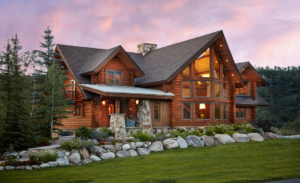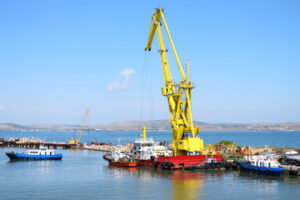Richardson Log Homes LLC feature stunning scenic backdrops, which draw people to them. They also provide a sense of security and comfort to people living there. In addition, they have several health benefits.
These log homes are built with either a purlin or rafter roof structure. The latter often uses wooden frame construction for second floors, which must be considered in the design.

A log cabin evokes a sense of rustic charm and timeless elegance. This aesthetic appeals to discerning men who appreciate the strength of nature woven into interior design. The natural materials in a log home allow the structure to breathe, reducing humidity levels and preventing mold and mildew. The low level of moisture also helps to reduce allergens in the air. This is a significant benefit for those who suffer from respiratory problems such as allergies and asthma.
Incorporating wooden furniture and accessories is essential to achieving the ideal log cabin aesthetic. Choose furniture made of oak, cedar, or mahogany. This furniture will help to create a warm and inviting atmosphere in your log cabin. In addition, choose accessories with a natural feel, such as stone coasters, leather vases, and rustic candle holders.
Another way to add a natural element to your log cabin is to use moss and other greenery. This will create a cozy and comfortable space and provide a natural contrast against the wood accents of your home. Incorporating animal accents is another way to enhance the crude log cabin aesthetic. However, be sure to use them sparingly to avoid overdoing it. Animal accents can include fur, bearskin rugs, or antlers. These decorations are ideal for those who enjoy outdoor activities such as hunting and fishing.
Adding large windows to your log cabin will help to enhance the natural aesthetic. Natural light will illuminate the wooden surfaces of your log cabin, highlighting every knot and grain in the timber walls. In addition, the sun’s golden rays will cast long, serene shadows across your space. This ambiance will inspire creativity and relaxation.
Log cabins are versatile structures that can be used in various ways. They can serve as a vacation home or office space and are also suitable for families and pets. They are also durable and aesthetically pleasing. However, they can be difficult to maintain because of their unique construction style. This is especially true if you live in an area with extreme climate changes.
Another advantage of log cabins is their energy efficiency. Their natural insulating properties allow the wood to store heat and keep the interior temperature stable, regardless of outside conditions. This helps regulate your body’s internal temperature, improving health and comfort. Additionally, you can install alternative heating systems, such as mini-split heaters, to reduce energy costs.
Many people buy a log cabin because they feel an emotional yearning for this kind of lifestyle. Whether it is a weekend getaway or a primary residence, log cabins offer an escape from the hectic pace of modern life and are a great place to relax and enjoy nature.
Although some people find log cabins uncomfortable, others love the quiet and peaceful atmosphere they create. These homes are less expensive than traditional brick homes, and their resale value is very high. It is important to research and select a builder who uses quality and reputable materials. In addition, you should consider the type of flooring and the size of the windows. You should also choose a design that suits your needs and budget. For example, if you plan to use your log cabin as a living space, it should be large enough for guests and family members to spread out.
Log cabins are built with wood, which is a natural air purifier. They also keep indoor temperatures stable during different seasons. This means you don’t need as much energy when heating or cooling your home. These characteristics make log cabins ideal for those who want to live a healthier lifestyle.
Another health benefit of a log cabin is that its wood walls breathe naturally, which helps maintain a healthy indoor humidity level. This can help prevent the growth of mold, mildew, and insect infestations. In contrast, conventional homes with sealed wall cavities often develop these problems because the toxins in the building materials are released into the air over time. Additionally, wood is a natural insulator and can conserve energy.
In addition, log cabins are often located in scenic areas that provide opportunities for outdoor activities. This can improve physical health by lowering stress levels and increasing energy. Additionally, spending time outdoors can strengthen immunity and lower blood pressure.
Moreover, log cabins can be built from locally available materials, reducing transportation’s environmental impact. They also provide a better alternative to traditional construction materials made from synthetic compounds. In addition, logs are made of a renewable material and decompose without causing a growth in the carbon footprint. Additionally, they can be treated with environmentally friendly preservatives that protect against pests and moisture. This can save you money on maintenance and the cost of buying new materials. Many people also install gutters that collect rainwater for watering their gardens or washing cars. This can also reduce their energy consumption, as they can use the collected water instead of using artificial heat sources.
Before building a log cabin, you should ensure you have planning permission from the local authorities. This is important to avoid any future problems. Besides, building without a permit can result in fines and sanctions. Non-compliance with the rules can also lead to your log cabin being demolished. Fortunately, there are several ways to obtain the necessary permits.
For instance, you will need a residential permit if you plan to use the log cabin as a primary residence or as a holiday rental. You will also need a permit if the structure could restrict your neighbors’ views or require wider and newer road access. Depending on local laws, you might need a higher rate for the log home construction.
However, if you are constructing the log cabin on your property, you don’t need planning permission. In most cases, garden buildings like log cabins don’t need planning permission because they are regarded as “permitted development.” BillyOh’s log cabins, for example, are constructed with these types of regulations in mind.
To qualify as permitted development, the log cabin must be within two meters of the property boundary and not exceed 2.5 meters in height at its highest point. The building must be a single-story and not occupy more than 50% of the original garden. There are also stricter requirements for building on Designated Land, including Areas of Outstanding Natural Beauty, Conservation areas, World Heritage Sites, and National Parks.
Zoning and building codes are separate, but both must be followed by anyone who owns a tiny cabin. The zoning code determines where to build the house, while the building codes dictate how to construct it. It’s crucial to follow these standards, as they are designed to promote safety for the inhabitants of the tiny cabin.
If you’re considering buying a log cabin, you should research and get estimates from several vendors. This will help you avoid unexpected expenses. If you plan to build your own home, consider all the costs, including materials and labor. Also, remember to factor in extra costs, like septic systems or water wells. These will add to the overall cost of the project.
Timber or lumber is one of the biggest costs for a log cabin. This can be purchased directly from a timber supplier or through a sawmill. The former method can be more costly because it involves transporting the logs to a mill and your building site. Remembering that the logs must be treated and weather-proofed before they are used is important.
Another big expense for a log cabin is its upkeep. A typical cabin is in a rural area, so it must be connected to sewer systems and water supply lines. This can be expensive, but it will save you money on utility bills in the long run.
A log cabin is an excellent way to reconnect with nature. It can be a peaceful and relaxing environment, with the wood’s natural insulating properties keeping the inside temperature comfortable throughout the year. This allows the body to maintain a steady temperature, benefiting health and well-being.
Aside from the aesthetic, log cabins are affordable and easy to maintain. They are also a great place for family and friends to gather together. Plus, they offer a sense of security and comfort that is hard to find in other homes.
